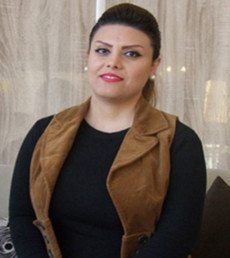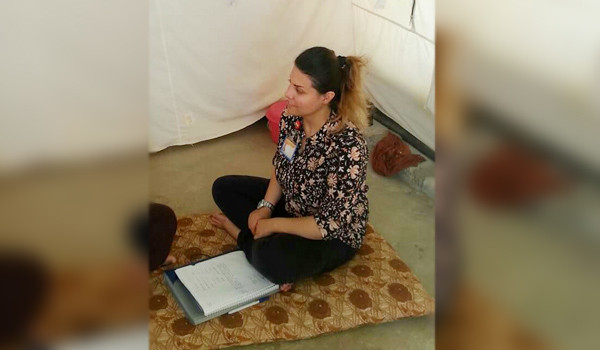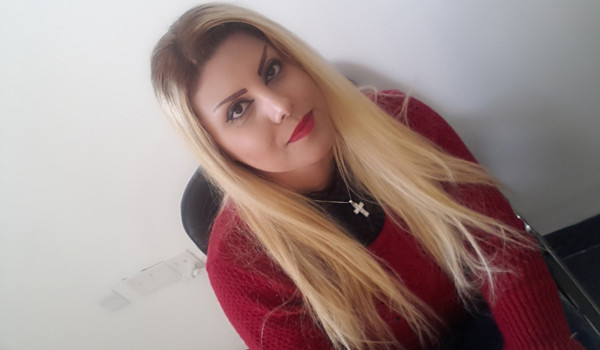

“I wish you were my neighbor so that I could see you every morning”, this is what an Ezidi girl survivor of Islamic State (IS) brutality said as she was talking with her social counselor whose answer was “You are my little sister; I will stay here with you.”
Rita Bahnam, a social counselor at an IDP camp in Duhok province has become friends with this traumatized Ezidi girl. She says, “At the beginning she was psychologically traumatized due to the horrible treatment she endured at the hands of her captors. She hardly spoke or sleep because she was afraid that IS will abduct her again, but she responded to the treatment and psychological therapy more rapidly than we expected.”
“She always receives me with a big smile. She needed someone to understand her. At first her words didn’t make sense; she needed enormous help until she gradually recovered, and that made me so happy”, says Rita.
Rita Bahnam, only in her mid-twenties, was born and grew up in Mosul. In 2007 she moved to Duhok along with her family due to the volatile situation of the city. In Duhok, she perused her studies in the Department of Education and Psychology in Duhok University. After graduation, she started working with PSS teams with Ezidis, especially the female survivors of IS in October 2016.

When she started, she did not any experience, other than what she learnt from her university, "I faced tremendous challenges, mainly due to not speaking Kurmanji Kurdish that Ezidis spoke." The accent Ezidis use is different from the speakers of the same dialect in Duhok. After a while, she could master the dialect, which helped her communicating with the Ezidis.
It all started when she heard that Zhinda, a partner organization of WADI, needs a social worker. The job was within her specialization. Since then, she is busy helping people constantly. She starts as early as any other worker but stays until 07:00 PM. If a case is referred to a hospital, she has to wait and oversee it, which extends her work to 09:00 PM in some cases.
In Sharya, Khanke and Ba’azri camps in Duhok, Rita provides her Psycho-social services for the IDPs and people living in unfinished house-structures outside the camps as well. Rita discusses the challenge of working with survivors, "Fear still haunts, them. They do not trust people after what they have undergone." Some families are more restricted as they refuse to provide their phone numbers for the time of crisis; some others offer two for emergency.
She has to try hard to win their trust, "Do not consider me more important than you. I am your sister; if you accept me as a sister then I will be pleased." Most of them accept, as "there is nothing sweeter than to have a sister," they respond. The trust building comes with conversations. They talk and talk. She has to listen very carefully, not interrupting at any time. She collects information from the family, the state of the victim and her background. She has to devise a new plan on how to approach her and how to speak to her. Most displaced people in Duhok are Ezidis, Christians and other minorities who were in Nineveh before.

After ISIS assault in mid-2014, their belongings were seized. They hardly survived with their lives. One victim shocked Behnam. Her family did not accept her anymore as she was captured by the ISIL. When she tried to talk to her, she refused, "They all come and ask about how do I feel." She felt dizzy and fell on the floor.
Some families may not accept those who were IS hostages, as the traditional norms do not allow them. She did not give up on her. After two days, she visited her again. Gradually, she could make her speak, and feel better. Among common traits, she said, is that they suffer insomnia and isolation. They do not go out. They don't want to see people. They can't sleep well. As with this case, Behnam has a specific method. She first imagines herself in the victim's shoes. Later, she searches the internet for simiar cases and instructions on how to solve it.
According to the statistics of the KRG’s Ezidi Affairs Department An estimated 6,417 Ezidis were held captive by the Islamic State group, half of them were women.
Ezidi women and girls were taken to slave markets in Mosul and Syria. They were subjected to sexual violence and cruel treatment by the IS militants they had to serve.
Rita Behnam says that despite the many obstacles she is happy and loves her works. The difficulties she face encourages her to do more to alleviate some of the suffering of Ezidi survivors.